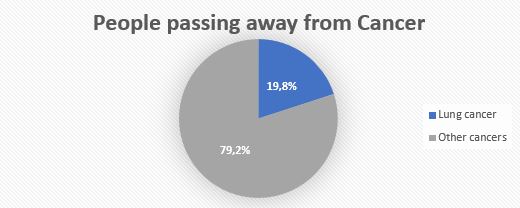November is the lung cancer awareness month and we believe it is our duty, as a renowned international health insurer, to foster consciousness on this deadly disease.
Lung cancer is the most common cause of death from cancer worldwide. This devastating cancer is estimated to be the source of nearly one in five deaths (1.59 million deaths, 19.4% of the total).

Lung cancer occurs when some lung cells undergo a mutation that causes them to multiply out of control. This generates a mass of cells that grows continuously, in an unstructured way. This growth can affect nearby structures, but it can also cause some of the tumour cells to enter a blood vessel and move to another organ in the body, causing metastasis.
In most cases, treatment will be based on surgery, chemotherapy or radiotherapy, and will vary depending on the type of cell causing the cancer and its extent.
The only effective way to reduce the risk of lung cancer is to avoid the risk factors that encourage its occurrence. And among them is one that stands out above all others: tobacco.
According to the latest data, about 30% of the population are regular smokers. We can therefore conclude that regular smoking increases the risk of lung cancer by 2.000% (21 times more risk). Although 90% of lung cancer cases occur among smokers a significant amount of non-smokers can also be at risk.
Passive exposure to tobacco (passive smoking) has an increased risk of developing lung cancer, with a risk estimated to be about 20% higher than that of a person not exposed to tobacco smoke.
There are other risk factors for the development of lung cancer, such as air pollution, exposure to radon, asbestos, arsenic, etc., but they are of less relevance compared to the risk caused by smoking.
One of the main problems of lung cancer is that the symptoms it causes are not very specific and often present late, causing the diagnosis to be made once the tumor has already spread:
| Symptoms | Explanation |
| Cough | This is the most common symptom of lung cancer, often accompanied by expectoration. The main problem is that cough is one of the most frequent symptoms in a health consultation. The main cause of coughing is respiratory infections. |
| Expectoration with blood | Also called haemoptysis. It is a more specific symptom that often leads to additional testing, although this can be caused by a benign pulmonary infection. |
| Lack of air | Also known as dyspnoea. It is a non-specific symptom and may be caused by lung infections or heart problems, among others |
| Chest pain | In the case of tumours that affect the chest wall or pleura (membrane that covers the lungs). It may be one of the early symptoms of this type of tumour. |
| Other symptoms | There are other less frequent symptoms such as dysphonia (voice changes), dysphagia (difficulty in swallowing) or non-specific symptoms common to any type of cancer such as weight loss, weakness, tiredness, etc. |
If you are suffering from any of these symptoms, or any other symptoms you feel could be related to lung cancer, then we can only recommend you to discuss the matter with your general practitioner. The doctor will be able to can determine whether your symptoms need specific testing or are caused by a respiratory infection, or another (pulmonary) disease.
All Foyer Global Health clients have unlimited and round the clock access to telemedicine where they can ask general questions about health topics, or specific health related inquiries, at no additional cost.
Health is your capital so take the best possible care of it and spread the word about the lung cancer awareness month!


